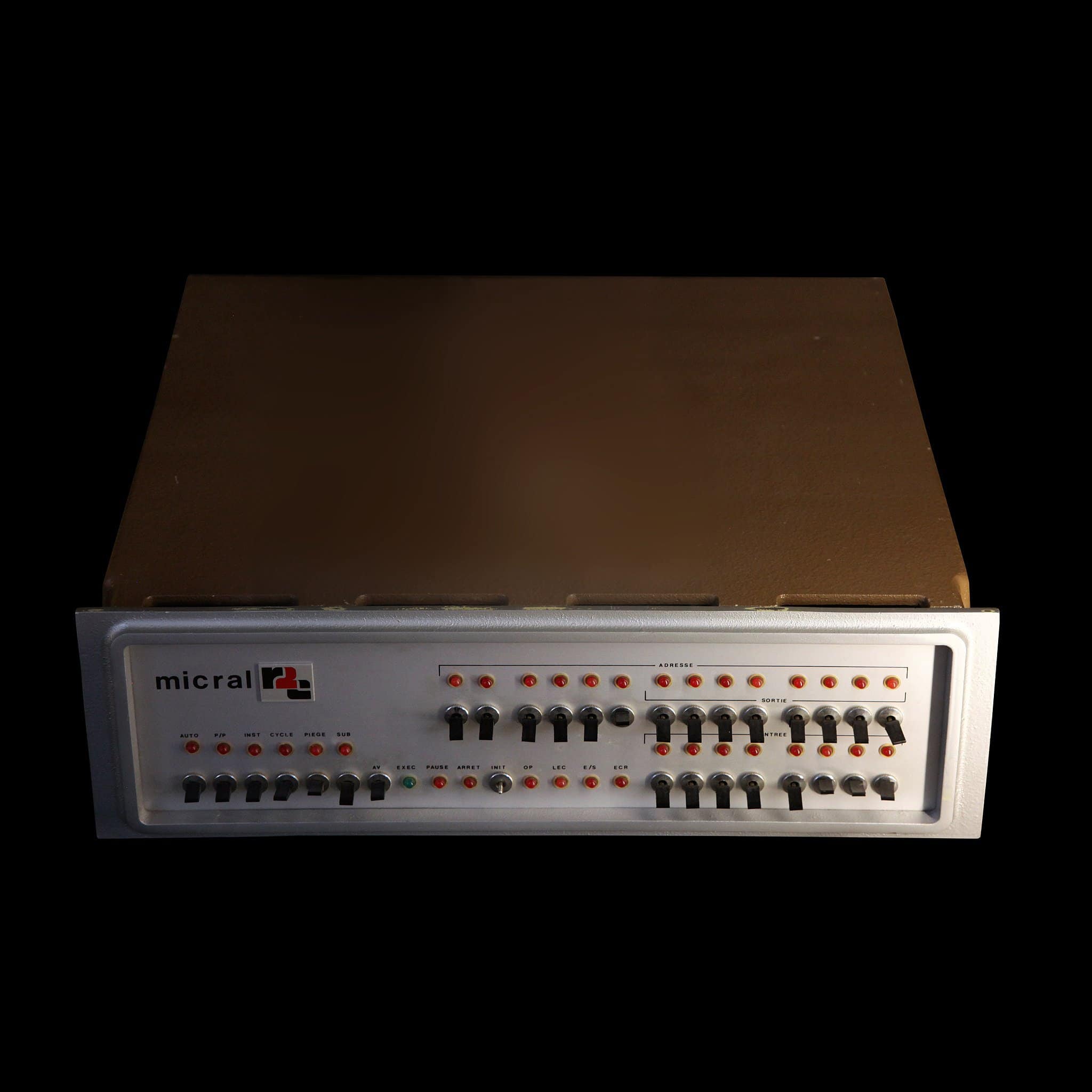The Micral Computer was created in 1973 by the French company Réalisation d’Études Électroniques. This was a series of micro-computers that became known as the earliest commercial personal computer.
The Micral N, produced in 1973, was the first computer of this series. This microprocessor-based computer was powered by Intel’s 8008 chip. The term microcomputer first appeared in print in reference to the Micral. The Micral N was initially developed for the I.N.R.A. (French National Institute for Agronomic Research) which was looking for a computer for process control in hygrometric measurements but didn’t have sufficient budget to buy the lowest “mini” at the time.
Quick Facts
- Original price
- 8500 French Francs (about $1300)
- Units Sold
- Approximately 90,000
Starting in 1973, when the Micral N was first introduced, the Micral Computer series produced nearly two dozen different versions before the last one premiered in 1989.
Six Facts about the Micral Computer
There are several important facts to know about the Micral Computer.
- The Micral computer series debuted its first computer in early 1973.
- It was a commercial computer based on a microprocessor, the Intel 8008.
- The Micral N was the first in the series and was produced by the company R2E.
- The device was considered the earliest non-kit personal computer.
- According to MO5, the Micral is considered the first microcomputer in the world.
- Altogether there were three separate series’ and 23 individual models.
The History of the Micral Computer: What to know
Before the 1970s, computers were large, massive machines that required thousands of transistors to run efficiently. These computers took up a lot of space for data storage. They were operated by technicians, often wearing white lab coats. The Micral was the first to bring the computer to the average person. This was really the beginning of the desktop computer age.
The development for the Micral began in July 1972 in a hut in the Paris suburb of Chatenay-Malabry. Frenchman Francois Gernelle worked with a team of three collaborators. This included Alain Lacombe who was an electrical technician, Jean-Claude Beckmann who was in charge of mechanical parts, and Benchetrit, a software engineer.
By January 1974, the Micral was known as the first of a new and exciting generation of small computers that would primarily feature process control and an affordable price. People would be able to own a desktop computer or what became known as a personal computer. François Gernelle patented different features of Micral in France (patent FR2216883), Germany (patent DE2404886), Netherlands (patent NL7401328), Japan (patent JP50117333), and the USA (patent 3974480).
The first Micral (see the lower image) was delivered to the I.N.R.A. in January 1973. The machine was commercialized in February 1973 by the company R2E which was founded in 1972 by Gernelle and his ex-colleague Andre Truong.

Micral Computer Versions: Each Edition
There were three categories of Micral Computers, with several computers in each category. The first group of Micral Computers was the R2E series. These included the following:
- Micral N – First microcomputer built in 1973 by Francois Gernelle
- Micral G – Built in 1974, at 1 MHz with Intel 8008, 16K RAM
- Micral S – Built in 1974 with Intel 8080
- Micral M – Built in 1976 with the Intel 8080 x 8
- Micral C – Built in 1977 with Intel 8080, 24K RAM, a floppy disc drive, and monitor
- Micral V – Built in 1978 with Intel 8080, 32K RAM / portable device
Version 1 – Micral N, 1973
The founder of R2E, André Truong Trong Thi, asked Francois Gernelle to develop the first Micral for the Institut National de la Recherche Agronomique. The development began in June 1971. The computer was supposed to be completed by December 1972. Beckmann, Benchetrit, Lacombe, and Gernelle worked 18 hours a day in a cellar to make sure the computer could be delivered in time.
The computer contained an Intel 8008 microprocessor with MOS memory instead of core and had 500 kHz. It was sent to I.N.R.A. by January 1973 and came out commercially in February 1973. It cost 8,500 Francs, which was about $1,750. This first computer was paving the way for how computers handled data storage.
The 8008 CPU that powered the Micral was Intel’s first 8-bits processor. This was an improvement of Intel’s first microprocessor, the 4004. It was available as a DIL chip with 18-pins and was originally intended to be a custom chip for Computer Terminals Corp. of Texas. CTC rejected the 8008 because it was too slow and required too many supporting chips.
When Intel offered it to the open market, it was not very successful. It was not the fastest-selling desktop computer that they may have hoped for. It’s estimated that only a few hundred of the Micral N were produced and purchased. The attempt to market the computers in the United States failed. The Micral N was basically a commercial failure.
Versions 2 & 3 – Micral G & S, 1974
The second Micral model, 8008 based at 1 MHz with 16K RAM, was called the Micro G. The Intel 8080 was introduced in April 1974. The third version came out at the same time as the second and was called the Micral S.
Versions 4, 5, & 6 – Micral M, C, & V
These versions started with the Micral M. The Micral M system had a distributed multiprocessor system that shared task management and common resources. Versions C and V came out in 1977 and 1978.
The Second group of Micral Computers was the Bull series. These included the following:
- Micral 80-30 – Built in 1979 with Zilog Z80
- Micral 80-20 – Built in 1980 with Zilog Z80 A and 3 MHz
- Portal – Built in 1980 with Intel 8085 and 2 MHz
- Micral P2 – Built in 1981 with Zilog Z80, 64K RAM, and 5 MHz
- Micral X – Built in 1981 with Zilog Z80 and 10 MB hard disc
- Micral 90-20 – Built in 1983 with Intel 8088 and 5 MHz
- Micral 90-50 – Built in 1983 with Intel 8086, 256K RAM, and 8 MHz
The Third group of Micral Computers was the PC Compatible series. These included the following:
- Bull Micral 30 – Built in 1985 with Intel 8088, PC-XT compatible at 4.77 MHz
- Bull Micral 60 – Built in 1986 with Intel 80286, PC-AT compatible at 6 MHz
- Bull Micral 35 – Built in 1986 with Intel 80286 and 8 MHz
- Bull Micral 40 – Built in 1987 with Intel 80286 and 8 MHz
- Bull Micral 45 – Built in 1988 with Intel 80286 and 12 MHz
- Bull Micral 65 – Built in 1988 with Intel 80286 and 12 MHz
- Bull Micral 75 – Built in 1988 with Intel 80386 and 8 MHz
- Bull Micral Attache – Built in 1988 with Intel 8086, portable, and 9.54 MHz
- Bull Micral 200 – Built in 1989 with Intel 80286 and 12 MHz
- Bull Micral 600 – Built in 1989 with Intel 80386 and 25 MHz
Considering the total sales of all the different models, the Micral was considered a successful market product. The fastest-selling models came later as more versions were developed. The company R2E eventually sold about 90,000 units of the Micral that were mostly used in vertical applications such as highway toll booths and process control.
Bull bought Zenith Data Systems in 1989. After that, they began releasing PC compatibles under the Zenith brand. The Micral is no longer produced in its original form.
The Micral Computer – The Public Response
When the Micral Computer was first released, the first version, Micral N, did not do very well. Later versions, however, were more successful. It’s important to note, that while the Micral Computer was considered fairly successful in France, it never penetrated the American market.
The legacy of the Micral seems to grow stronger with time. Paul Allen, the co-founder of Microsoft, purchased a Micral N in France on June 11, 2017. He bought the computer for his Seattle museum called Living Computers. Allen was the co-founder of Microsoft, along with Bill Gates.
Even though many versions weren’t the fastest-selling products the company had hoped for, the Micral did make a lasting impact on the personal computer market and changed the way data storage works.
The image featured at the top of this post is ©François Gernelle / Rama, CC BY-SA 3.0 FR, via Wikimedia Commons.
